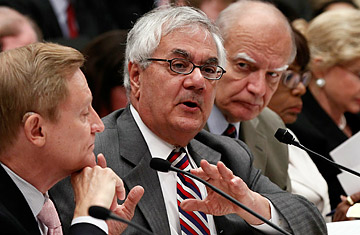
House Finance Committee chair Rep. Barney Frank addresses the House-Senate Conference Committee meeting on the "Wall Street Reform and Consumer Protection Act"
Congress, led by House Banking Committee Chairman Barney Frank, is poised this week to deliver a much needed victory to President Barack Obama as it wraps up legislation overhauling the rules that govern Wall Street. But first the negotiators have to reach an agreement. And given the extremely high stakes, that's no easy task.
Both the politicians crafting the bill and the legions of lobbyists trying to shape it are mindful of the fact that any legislation aimed at preventing another financial crisis must walk a fine line, tightening regulation while not stifling innovation or pushing talent to freer markets. In a bid for transparency — and to make it harder for Wall Street to lobby members — Frank insisted that negotiations over the House and Senate versions of the bills be broadcast live on C-SPAN, a congressional first. Not that 95% of viewers could possibly understand what's going on — reporters in the room would hardly be able to keep up if it weren't for staff standing by to explain each offer and counteroffer as they're bandied about.
With conference committee negotiations about halfway done, no player or interest group is ready to declare victory yet. Last week, Wall Street achieved a few modest wins: the Senate rejected a House proposal that would have required shareholder votes on executives' golden-parachute packages; it also rejected a provision that would have allowed shareholders to sue outside businesses that helped a company defraud investors — the Government Accountability Office will do a study on the issue instead. Credit-rating agencies also got off the hook with a study into their conflicts of interests with the banks they cover (and which pay for that coverage). Members voted not to require that the New York Federal Reserve chairman — a position that usually has much interaction with and oversight of Wall Street — be confirmed by the Senate. And small companies — those with less than $75 million in market value — won an exemption from a requirement that auditors assess their safeguards to prevent misstatements and fraud.
This week promises to be a lot harder on Wall Street, though. Still undecided are three key provisions that look likely to drag the bill further to the left than anyone expected when this process started more than a year ago. The most controversial piece comes from Arkansas Senator Blanche Lincoln, whose victory in her primary earlier this month was aided by her populist amendment that would require banks to spin off their derivatives desks. In the face of fierce bank opposition and resistance from the White House and regulators, it looks as if a scaled-back version of Lincoln's provision will be included in the final bill. Also likely to be included: the tough so-called Volcker rule, named for former Federal Reserve chairman Paul Volcker, which would ban banks from trading their own holdings — essentially restricting them from participating directly in the ultra-lucrative world of private equity and hedge funds. Finally, the fate of a House provision that would create a $150 billion fund to pay for the cost of dealing with bankrupt financial institutions, paid for with new fees on firms worth more than $50 billion, remains undecided.
Bankers are anticipating this week with some trepidation: if things don't go their way, they believe the bill could have a long-lasting effect on the way they do business. The U.S. could create a hostile financial-services environment with no incentive for "even the plain vanilla" transactions, warned Malcolm Knight, Deutsche Bank's vice chairman, at a conference of financial regulators in Montreal last week. "You have to make choices as regulators between those elements of weakness in the financial system that need to be and should be corrected by the private sector itself and those where you have to intervene," he said.
Frank discounts such worries, noting that venture-capital funds won an exemption from the Volcker rule and that many other, tougher provisions have been dropped along the way. "We know we have an industry that will innovate and an industry that will try to get around some of these things," Frank said at the outset of the conference. "This is not a static bill. This is a framework that allows for appropriate innovative regulation going forward that will meet innovative financial activity."
The negotiations are scheduled to wrap up on Thursday, June 24, with House and Senate passage expected in the ensuing weeks. Politically, financial reform should prove to be a win for Obama and the Democrats. But in the long term, like any sweeping piece of legislation, it'll take years before anyone really knows if it was a smart bet.
